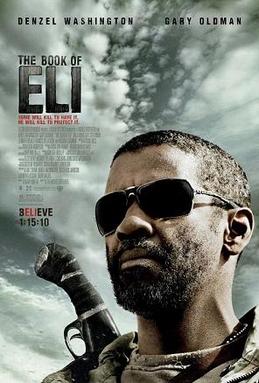In a post-apocalyptic future, a mysterious traveler named Eli (Denzel Washington) wanders west across miles of scorched and barren desert. Along the way, he stops in a reconstructed town whose educated mayor, Carnegie (Gary Oldman), covets a certain book, believing it to be the key to expanding his power. That book is later revealed to be the last remaining Bible, which Eli just so happens to have in his possession.
It’s been nearly a decade since the Hughes Brothers’ last film (From Hell) and their latest effort seems like a significant departure. Released in the wake of The Road, The Book of Eli shares that film’s battered landscape, cannibal gangs and yearning for lost decency. But while The Road is a highly personal story told in a strikingly lyrical style, The Book of Eli is much more of a universal tale and functions as a parable. The thematic gist of the film – that religion can be a great creative or destructive force – is neither original nor complex, but the way in which that point is made is thoroughly engaging.
As entertainment, The Book of Eli also boasts a relatively quick pace and some exhilarating combat scenes. Cast against type, Washington brings a quiet determination to Eli, a resolute man on a mission. Oldman, in contrast, overacts in yet another one of his eccentric villain roles, but he does it so well that his scene-chewing can be forgiven. The female lead is filled by Mila Kunis, who occasionally feels like dead weight as she flees Carnegie’s clutches to join Eli on his quest. Other familiar faces (Tom Waits, Jennifer Beals, Malcolm McDowell) show up in bit parts, but only Michael Gambon and Frances de la Tour – a whacked-out old couple with a house full of grizzly secrets – leave a lasting impression.
The Book of Eli’s overt religious symbolism will likely divide viewers, as will a twist ending which forces a reexamination of the entire film up to that point. For those who can accept its premises, The Book of Eli offers both punch and purpose.
7.25/10





